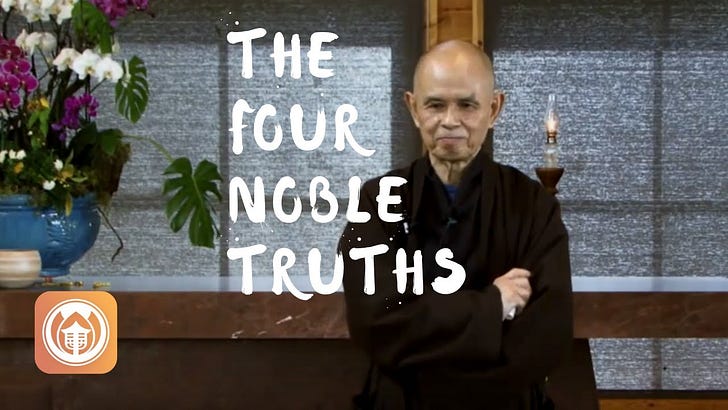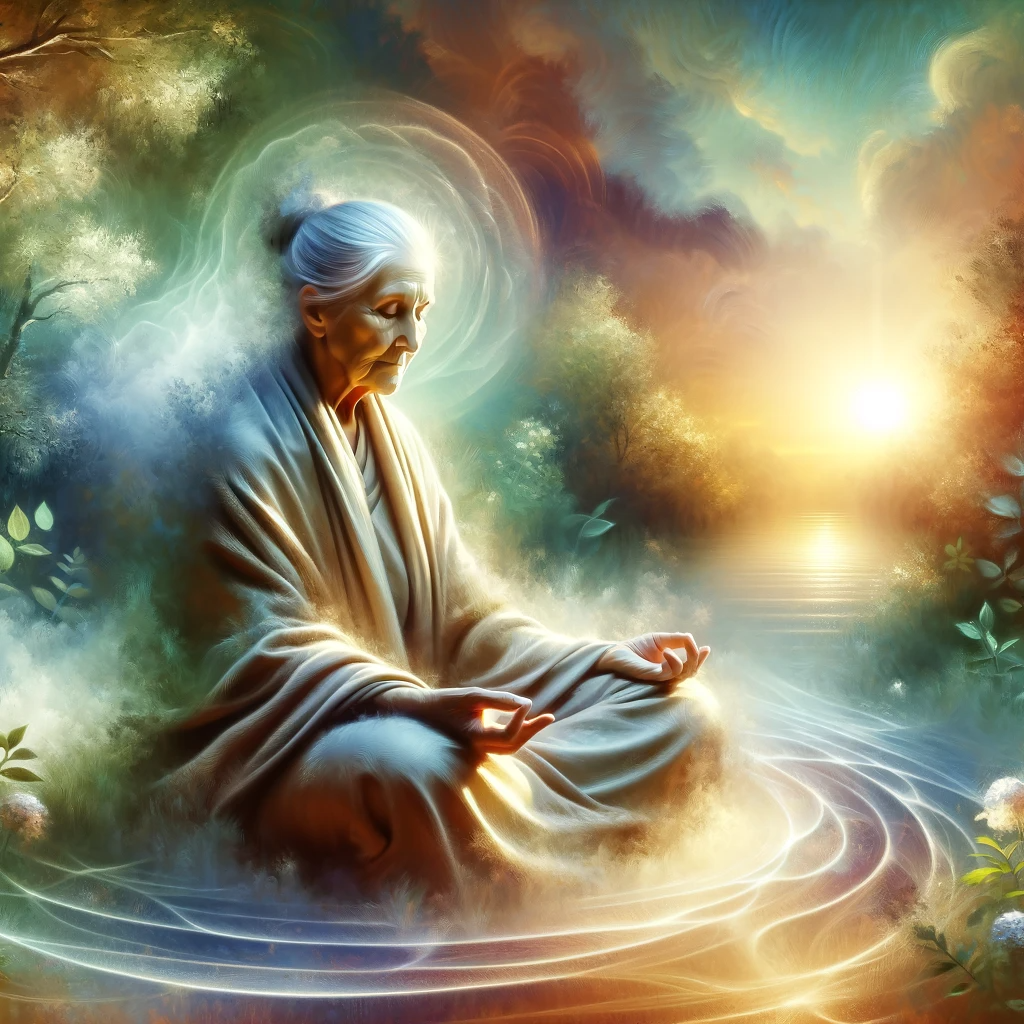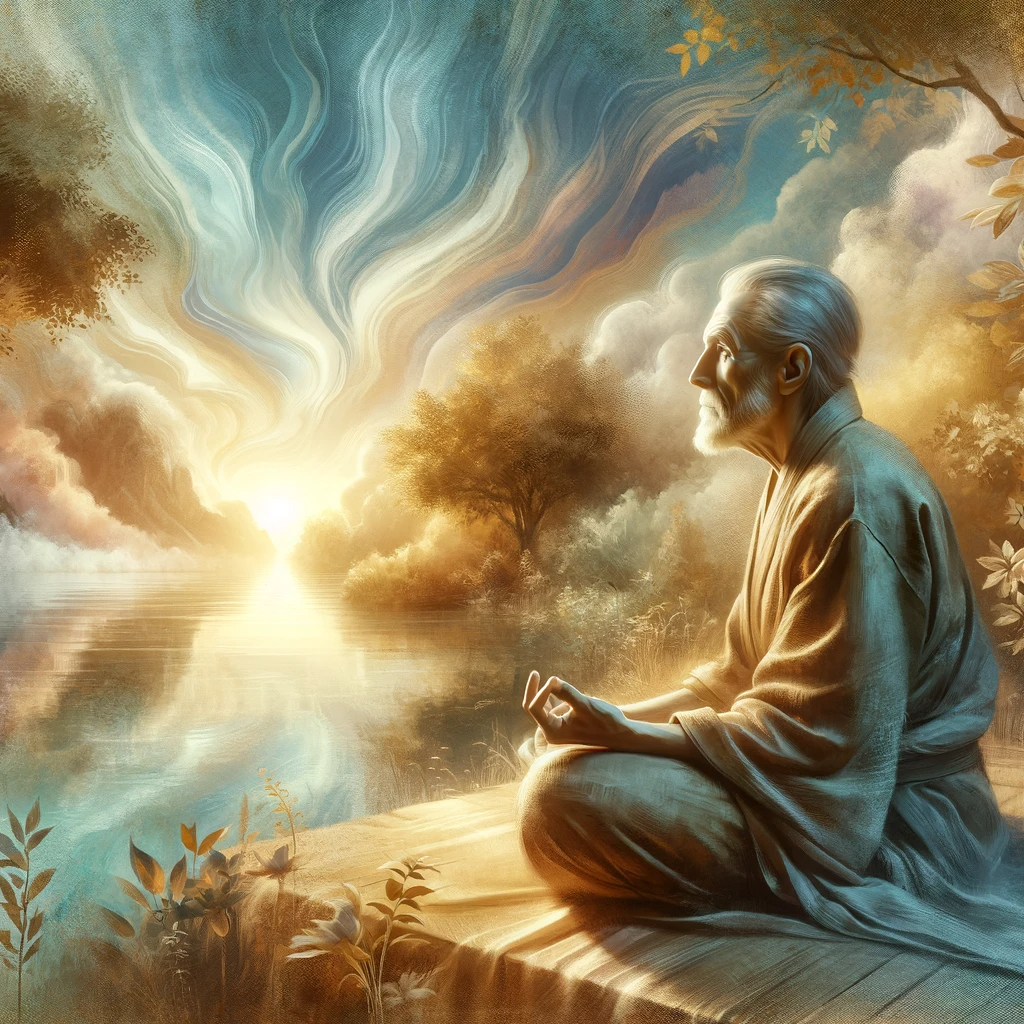Salvation in the afterlife is the shared quest in Pure Land Buddhism and Evangelical Christianity.
Salesmanship of Organized Religion
Religions must compete in the marketplace of ideas. If the sales pitch isn’t compelling, people won’t follow it. Without adherents, the religion dies.
Religions all use a carrot-and-stick approach. Some emphasize the carrot, like the Christian heaven or the Buddhist pure land, and some emphasize the stick; both Christianity and Buddhism posit a Hell, a place of eternal damnation.
A good salesman or religious missionary will start by offering the lure of a carrot, but if that should fail, they generally resort to fear of the stick.

Spreading the Good News
An old Inuit and a Christian missionary had a conversation about the teachings of Christianity.
The missionary explained the basics of the Christian faith, including the concept of heaven and hell, and how one’s actions on earth determine where one will spend the afterlife.
After listening carefully, the Inuit elder asked the missionary, “If I did not know about God and sin, would I go to hell?”
The missionary replied, “No, not if you did not know.”
Then the Inuit responded, “Then why did you tell me?”
Reflect for a moment on the meaning of that story.
The Christian missionary believes he is saving people from harm. However, he’s unwilling to believe God is so cruel that He would condemn people to Hell for their ignorance. Who would worship such a Being?

His zeal blinds him to the obvious conclusion that he personally condemns each person to hell once he shares the “Good News” and they don’t accept his faith. While he envisions himself as an agent of God, he actively recruits for the Devil he fears most.
The rhetorical sophistry employed to get around this problem is truly remarkable. The video below is an attempt from an intelligent and articulate Christian. See if you find it convincing.
All attempts at persuasion require a shared belief system. If you reject the foundational beliefs of that religious worldview, like people need forgiveness for their mistakes from some outside source like God, or people need forgiveness for being born with Original Sin, then their attempts at persuasion, no matter how well intended, fall flat.
Relief of Suffering Versus Forgiveness of Sins
As a practicing Buddhist, I’ve been asked why the Buddha focused so much on suffering. Isn’t this a made-up problem like the Christian original sin?
When I’m not up for a debate, I’ll answer that perhaps the Christian original sin is the dukkha or suffering the Buddha was talking about. However, since Eastern Orthodox Christians are among the only ones who conceive of original sin this way, that response isn’t often convincing.
The concept of “Original Sin” in Evangelical Christian theology is a doctrine that describes the fallen state of human nature due to the first sin committed by Adam and Eve in the Garden of Eden. In other words, believers inherit the sins committed by their forebearers even though they personally did nothing wrong.

Christians who like to argue their faith sometimes become angry when I point out that if someone rejects Original Sin, then they don’t need the Christian God, nor do they need to fear the Christian Hell. The Christian worldview can safely be rejected in its entirety—as can any organized religious dogma.
If someone instinctively follows the Golden Rule, is predisposed to be happy nearly all the time, is naturally inclined to positivity, and is not prone to anger, jealousy, or attachment to worldly objects, then they have no need for Buddhist practice or any religion for that matter.
Some people are born with those dispositions. Perhaps they are spiritual masters reborn from a previous incarnation. Perhaps they are simply lucky, but Buddhism is a practice for those who need it, for those who notice their suffering and are inclined to do something about it.
Suffering is its own stick. If suffering beats a person hard enough, they will seek a way to avoid the beatings. The cessation of suffering, as outlined in the Four Noble Truths, is either a carrot, a defense, or medicine if you prefer the medical analogy.

Suffering and Salvation: Understanding the Four Noble Truths of Buddhism
What Have You Done For Me Lately?
Every religion makes an ask. There is something that is required in order to either avoid the stick or obtain the carrot. Some religions make it easy, and some do not.
Søren Kierkegaard, the Danish philosopher, argued that the Church made Christianity too easy and convenient, thus losing the essence of faith. Some practicing Buddhists contend that enlightenment is too difficult to reach, and nobody ever seems to get there. Perhaps it’s too hard.
Whether it’s easy or difficult, there is always something that must be done.
Evangelical Christianity
Evangelical Christianity makes it easy. Simply accept Jesus Christ as your savior, and you’re saved; nothing else is required. Some churches add repentance of sins and a personal relationship with God, but they often vary on exactly what that means.

Each church follows a carrot-and-stick approach to compel compliance with its worldly dogma, but in Evangelical Christianity, access to heaven and avoiding hell are neither difficult nor complicated.
Accepting Jesus as Personal Savior and Lord: A personal decision to accept Jesus Christ as one’s Savior and Lord is considered a pivotal step.
Central to Evangelical belief is the conviction that salvation and, thus, access to heaven is through faith in Jesus Christ. This is based on scriptures such as John 3:16, which states, “For God so loved the world that he gave his one and only Son, that whoever believes in him shall not perish but have eternal life.”
Evangelicals believe that Jesus’ death and resurrection provide the only basis for the forgiveness of sins and the assurance of heaven. In other words, it’s our way or the highway—straight to hell, chased by a stick.

Repentance and Confession of Sins: Evangelicals emphasize the importance of acknowledging and turning away from sin. 1 John 1:9 states, “If we confess our sins, he is faithful and just and will forgive us our sins and purify us from all unrighteousness.”
The act of repentance involves a sincere commitment to turn from sinful behaviors and thoughts and to live according to God’s will.
This is a great spiritual teaching, but it’s also completely optional. The only action that’s required is accepting Jesus as a Savior.

Grace, Not Works: Evangelicals strongly hold that salvation is a gift of grace from God, not a result of human effort or good deeds.
Ephesians 2:8-9 states, “For it is by grace you have been saved, through faith—and this is not from yourselves, it is the gift of God—not by works, so that no one can boast.”
This doctrine asserts that no amount of moral conduct or religious activity can earn a place in heaven; it is only through God’s grace.
By giving up the stick, it’s sometimes challenging to induce Evangelical Christians to adhere to moral restraint and demonstrate good behavior. They view themselves as more moral than others, but their judgments sometimes fail to reflect the realities of what they think and what they do.
Redemption: One of the great appeals of Evangelical Christianity is its simplicity for obtaining salvation. Not everyone lives a life of moral restraint and virtue.
If you are past middle age, and you look back at years of immoral behavior, you are unlikely to turn to Buddhism, where you may face years of difficult penance and still face the uncertainty of human rebirth.
It’s much more appealing to have a change of heart and obtain instant redemption.

For example, in Star Wars, Darth Vader rejected a lifetime of evil and bad actions and was redeemed by a single good deed. From a Christian perspective, this makes perfect sense. From a Buddhist perspective, a single good deed doesn’t make up for a lifetime of non-virtue.
Should Darth Vadar go to heaven based on his final virtuous act?
If Adolf Hitler accepted Christ as his personal savior just prior to his death, would that erase the stains of the Holocaust?
The answer to both questions must be the same.
Living a Christian Life: While good works do not earn salvation, a genuine faith is expected to result in a transformed life, characterized by love, holiness, and obedience to God’s commandments.
This includes regular practices like prayer, Bible reading, participation in church life, and sharing one’s faith with others.

For many Christians, accepting Jesus is transformative. Whereas Buddhists spend years of meditation and heart training to transform themselves, some Christians gain these insights in a moment when they accept Christ as their savior.
Unfortunately, for many others, the peak emotional experience of salvation fades, the changes to their hearts are ephemeral, and they find themselves engaging in the same bad behaviors as before, but with a heightened sense of moral superiority to further cloud their minds.
Christian Heaven
When it comes to providing a carrot, it’s difficult to compete with the Christian Heaven.
The Christian concept of heaven is often depicted as a place of sublime beauty and eternal peace. It is envisioned as a realm beyond the physical world, transcending our earthly understanding. In this celestial paradise, the sky is a brilliant, unending azure, offering a sense of boundless freedom and infinite possibility.

One of the most comforting aspects of the Christian heaven is the reunion with loved ones. It is a place where the bonds of family and friendship are renewed and strengthened in the presence of God, free from pain, suffering, and the limitations of earthly life.
I tell my special needs son that he will see all of his family in Heaven House, the place where his Nana went several years ago. I don’t care about the existential reality of Heaven House or maintaining my purity of Buddhist doctrine. It makes him feel good to believe it, and it makes me feel good to tell him.
In Christian heaven, everyone enjoys the presence of God, who illuminates every aspect. There, the soul finds its ultimate fulfillment and eternal rest.

Escaping Buddhist Samsara
Buddhism is heavy on the stick. Everything in life is suffering, and you must practice diligently in order to escape the cycle of birth, aging, sickness, and death, or you will repeat a lifetime of suffering over and over again. Buddhism is hard.
Tibetan Buddhist Lamrim: Developing Renunciation for Samsara
The Buddha taught that one could escape samsara by obtaining full enlightenment. Once liberated, this life would be the last one. Unfortunately, for many, the relief of suffering is not enough. There isn’t a compelling carrot.
If there is an end to suffering, what happens after death? Is there any reward at the end of the rainbow?

The Buddhist Pure Land
Amida Buddha, also known as Amitabha or Amitayus in Sanskrit, is a central figure in Pure Land Buddhism, a branch of Mahayana Buddhism. He is particularly revered in Japan (where he is known as Amida), China, Korea, and other East Asian countries.
Amida Buddha’s story originates in several Mahayana sutras. These sutras describe how a monk named Dharmakara, after witnessing the suffering of sentient beings, made a series of vows and underwent countless eons of practice and merit accumulation.
Upon fulfilling these vows, he attained Buddhahood and became Amitabha, creating the Pure Land (Sukhavati) as a place of refuge and spiritual growth for all beings.
The teachings surrounding Amida Buddha focus on his compassionate nature and his promise to save all sentient beings.

Entering a Buddhist Pure Land is not as easy as accessing the Christian heaven. There is more preparation involved. Ultimately, the practitioner is instructed to purify their mind so that they experience a Pure Land on earth before they die.
Many practitioners consider a pure mind as a prerequisite for rebirth in a Pure Land. However, that’s a difficult path. Most laypeople prefer to believe that access to a Pure Land is easier.
However, there is a downside to the easier access. A Buddhist Pure Land is not permanent.
Rather than obtaining permanent life in the bliss of heaven like Christianity, Pure Lands are similar to Catholic purgatory, where impure individuals must still work on correcting their foibles.
A Buddhist Pure Land is a better place of rebirth where a practitioner can continue their practice with significant advantages in their next life.
My Personal Pure Land
I was born with many advantages in life. I was raised in an affluent Western culture, unfettered by survival concerns. I was born with a sharp intellect and exceptional hand-eye coordination into a loving and supportive family.
Unfortunately, this created its own set of challenges as I grew into a prideful and arrogant prick.
Pride and Arrogance, the Price for Being Gifted
I was blessed with an autistic son who provides me endless opportunities to practice giving, moral discipline, patient acceptance, and effort, four of the six perfections.
The Many Reasons I Love My Autistic Son
In short, my life is a Pure Land where I can practice Buddhism and improve my mental continuum. Who could ask for anything more?
The Forty-Eight Vows
Similar to asking Jesus for salvation, Buddhists are instructed to turn in faith to Amitabha to enter the Pure Land. However, even this less challenging path requires adherents to take vows—a great many of them.
The forty-eight vows of Amitabha are detailed primarily in the Larger Sukhavativyuha Sutra. These vows form the foundation of Amitabha’s commitment to save all beings and facilitate their path to enlightenment. The vows can be categorized into various themes, with the most important ones being:
- The Vow of Universal Salvation: Amitabha’s vows are centered around the promise to ensure the salvation of all beings who call upon his name with sincerity and devotion, enabling them to be reborn in the Pure Land.
- The Vow of Non-Discrimination: These vows emphasize the non-discriminatory nature of Amitabha’s compassion, asserting that all beings, regardless of their past actions, can be saved if they turn to him in faith.

- The Vow of Sukhavati (The Pure Land): Several vows describe the nature of the Pure Land, a place free from suffering and filled with opportunities for spiritual practice and learning. The Pure Land is depicted as a realm of beauty, peace, and spiritual richness, conducive to attaining enlightenment.
- The Vow of Assisting Enlightenment: Amitabha vows to help all beings in his Pure Land to attain enlightenment, providing the necessary conditions and teachings for their spiritual progress.
- The Vow of the Name’s Merit: One of the most significant vows states that simply reciting Amitabha’s name with faith can lead to rebirth in the Pure Land.
The 18th Vow: The Primal Vow
Among all the vows, the 18th vow, often referred to as the Primal Vow, is particularly crucial in Pure Land Buddhism. It promises that Amitabha will ensure the rebirth in the Pure Land of all beings who, with sincere mind, entrust themselves to him, aspire to be reborn there, and recite his name. This vow forms the basis of the nembutsu practice, which involves the chanting of “Namo Amida Butsu” (I take refuge in Amida Buddha).

Significance in Practice
The vows of Amitabha Buddha, especially the 18th vow, have a profound impact on the practice and faith of Pure Land Buddhists. Devotees focus on cultivating faith in Amitabha, reciting his name, and aspiring to be reborn in the Pure Land, where they can pursue enlightenment free from the distractions and sufferings of the samsaric world.
The forty-eight vows of Amitabha Buddha exemplify his boundless compassion and determination to save all beings. They provide the foundation for the Pure Land practice, where faith, devotion, and the recitation of Amitabha’s name are central to the path toward enlightenment.
Do we need heaven?
All organized religion offers some version of a heavenly reward after death, as an inducement to obtain followers. However, a great many people are non-religious and adhere to no particular spiritual tradition or practice.
While all religious adherents proclaim to know what happens after death, and they actively work to increase their faith in their beliefs, there is no verifiable proof that any of it really exists.

There is an ontological reality. When the body perishes and loses the capability to generate conscious perception, something happens to the conscious mind.
There is simply no way to know.
What happens after death is not testable. People who’ve had near-death experiences often claim to know, but near death is not actual death. Nobody actually knows, despite their claims.
Death is an information event horizon, a point where information only flows in one direction, forward. No one who’s actually perished can ever convey that information back to the living.
The key thing you must accomplish as you approach death is to cultivate a calm and accepting mind for whatever happens. It’s beyond your control, and worrying about it will only fill your final moments with anxiety.
It could be that one of the various systems of belief on what happens after death is right.
It could be that conscious existence merely ceases, and consciousness ends.
You can choose to believe whatever you want. No one can prove you wrong.
If believing in heaven or a pure land pleases you and provides you peace of mind in your final moments, you should embrace that.
I will.

